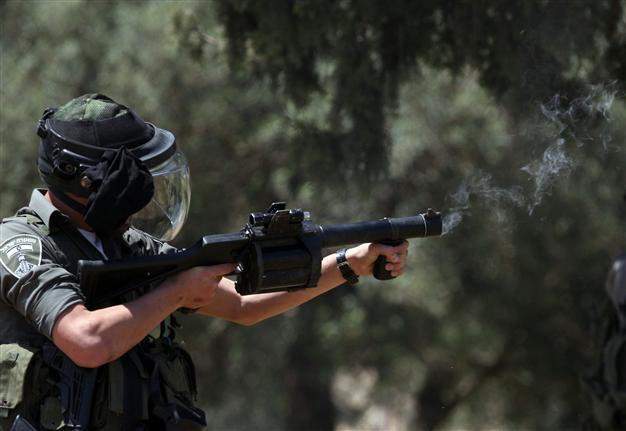Israel legalizes 3 settler outposts, angering Palestinians
JERUSALEM - Agence France-Presse

Smoke is seen from the barrel of a rifle after being fired by an Israeli soldier towards Palestinian protesters during clashes in the weekly Friday demonstration in the West Bank. AFP Photo
Israel decided today to legalize three settler outposts, which the Palestinians denounced as a response to a letter from president Mahmud Abbas demanding a halt to settlement activity if peace talks are to resume.A ministerial committee has decided "to formalize the status of three communities which were established in the 1990s," the office of Prime Minister Benjamin Netanyahu said.
That was angrily denounced by the Palestinians and by Israeli settlement watchdog Peace Now, which said it was the first time the Jewish state had created new settlements in more than 20 years.
The three outposts -- Bruchin, Rechelim and Sansana -- had no Israeli legal status since they were set up, but will now join the 120 official settlements dotted across the occupied West Bank that are home to more than 342,000 people.
The Palestinian leadership said the decision was "expected" and said it was "the Israeli answer" to a letter from Abbas to Netanyahu, in which he laid out the Palestinian grievances over the collapse of the peace process and outlined his demands for restarting negotiations.
Central to the letter was the demand for a settlement freeze.
"The decision on the settlements is the Israeli answer to president Abbas's letter," presidential spokesman Nabil Abu Rudeina told AFP, urging the Netanyahu administration to "immediately cease unilateral actions, especially settlement activity." In the letter, delivered to Netanyahu on April 17, Abbas demanded that Israel clarify its position on several key issues, including the principle of a two-state solution based on the pre-1967 lines and halting settlement activity.
Both sides agreed the Israelis would respond within two weeks.
But an official insisted the decision did not mean Israel had established any new settlements.
"This decision does not change the reality on the ground," he said. "It does not establish new settlements or expand existing settlements." His remarks were roundly denounced by Peace Now's Hagit Ofran, who accused the government of creating new settlements in a a deceitful way.
"The Israeli government is proving its true policy, that instead of going for peace, it is building new settlements," she told AFP on Tuesday.
"This is the first time since 1990 that the government of Israel decides on establishing new settlements, and the government's manoeuvre -- establishing a committee to establish the settlements -- is a trick aimed at hiding the true policy from the public," she said.
Under terms of a Supreme Court ruling last August, the Israeli government was required to address the legal status of some 16 outposts. In six cases, the government pledged to demolish the outposts, while in the remaining 10, which include Bruchin, Rechelim and Sansana, it said it would would legalize them.
On Monday night, Netanyahu's Forum of Eight -- a consultative body of his closest ministers -- decided to ask the Supreme Court to extend the deadline for the demolition of the Ulpana outpost, which is to be razed by May 1.
Ulpana, which is often referred to as a "neighbourhood" of the Beit El settlement, is built entirely on private Palestinian land and is home to 50 people.
"We will ask the High Court for a postponement in order to give us time to deal with it," Netanyahu told army radio on Tuesday.
Despite the government's pledge to the court to raze Ulpana, Netanyahu has said he is seeking ways to avoid demolishing the outpost.
"We are considering a few options," he said.
According to Peace Now, there are more than 100 "illegal" outposts at various stages of development in the West Bank, which were set up by various Israeli governments since the 1990s in an unofficial and illegal manner.
Israel only considers settlement outposts to be illegal, but the international community views all settlements as unlawful, whether approved by the government or not.
















